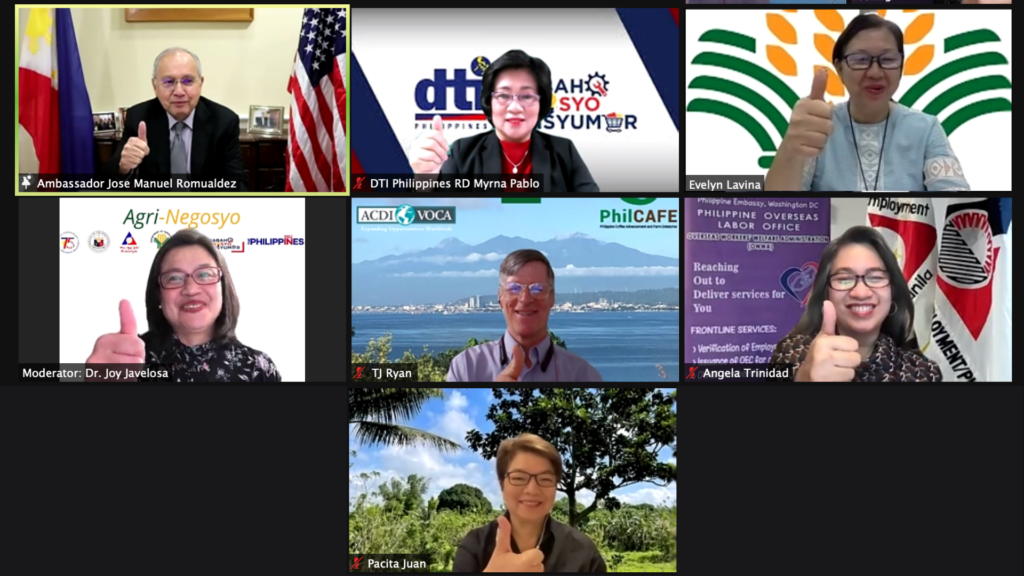PRESS RELEASE
WDC-13-2021
9 APRIL 2021
WASHINGTON, D.C. – On 8 April 2021, the Philippine Embassy hosted the first Agri-Negosyo webinar for Overseas Filipinos in the United States, highlighting investment opportunities in the Philippine coffee sector.
The webinar, “Agri-Negosyo for Overseas Filipinos (USA): Insights from the PhilCAFE Project”, featured a presentation by TJ Ryan, Chief of Party of the Philippine Coffee Advancement and Farm Enterprise (PhilCAFE) Project. Department of Agriculture Undersecretary for High Value Crops and Rural Credit Evelyn Laviña and DTI Regional Director for the Cordillera Administrative Region Myrna Pablo discussed their agencies’ respective programs in support of overseas Filipinos who may want to go into the business of producing and distributing Philippine coffee. Pacita Juan, President and Co-chair of the Philippine Coffee Board Inc., rounded up the panel as she shared the perspective from the private sector.
“It is such a testament to the strong resolve of President Duterte’s administration to help our repatriated OFWs and their families begin to make a brand-new start by putting together responsive and sustainable social protection packages with programs supporting food production and agribusiness as this field has been a bright spot for investments. The Agri-Negosyo Para sa OFWs Program offers strengthened and more efficient delivery of agribusiness-related programs and services from the concerned agencies to address the urgent need to provide livelihood for repatriated OFWs,” said Philippine Ambassador to the United States Jose Manuel Romualdez as he opened the virtual event.
The Philippines is currently the 4th largest coffee consumer in the world, but it imports 93% of its coffee requirement. The country grows all four coffee species: Arabica, Robusta, Excelsa, and Liberica, whose one specific variety is known as “kapeng barako”.
Focusing on the insights gained from the PhilCAFE Project, TJ Ryan said, “The opportunity in the Philippines is tremendous. It’s spectacular. Ninety-three percent of the coffee is imported, and the growth of brewed coffee is likely to grow in a robust way. Buyers are, of course, looking for producers who can deliver quality on a consistent basis. It’s a question of getting quality planting material, learning, good agricultural practices and good processing practices.”
PhilCAFE is an investment in the coffee sector that leverages private and public capital to put the National Coffee Roadmap into action. The project empowers legacy institutions such as the Philippines Coffee Council, state universities and colleges (SUCs), private universities, and industry actors to support the sustained development of the coffee sector.
“Coffee is a high value crop. It cannot be denied, however, despite being considered a value crop and a priority commodity, the full potential and growth of the industry are yet to be realized. Living within the limited budget, we at the Department of Agriculture have been implementing programs toward the development of the Philippine coffee industry,” Undersecretary Laviña stated during her presentation of the current government support programs for potential investors in coffee farms and related industries.
Meanwhile, DTI Regional Director Myrna Pablo referred to her agency’s Industry Cluster Enhancement (ICE) Program, which is a national strategy to enhance industry competitiveness to develop and expand exports, generate investments, and create jobs.
Pablo said, “Trainings and other technical assistance are given to coffee MSMEs like good manufacturing practices, roasting, green grading, cupping, product development, trainings on e-commerce, and marketing activities like participation in trade fair exhibits.”
Pacita Juan, President and Co-chair of the Philippine Coffee Board Inc. explained that their organization “has always promoted niche markets. This is our marketing strategy, if you will. Since we don’t have a lot of coffee to export, we have to find certain niches in the markets for coffee.”
She also highlighted opportunities for overseas Filipinos such as in planting coffee, providing the coffee farm experience, importing green coffee from the Philippines, or investing in the roasted coffee business.
“I know that some of you are not ready to come home. You can help us promote Philippine coffee by bringing Philippine coffee to America, albeit in green form so that you can roast it freshly in your neighborhood and put up a neighborhood café. So, I think there is a future to come home to,” Pacita Juan told the audience.
The event was moderated by Philippine Agricultural Attaché to the United States and the Americas Dr. Josyline Javelosa. Philippine Labor Attaché Angela Librado-Trinidad gave the closing remarks.
“Agri-Negosyo for Overseas Filipinos (USA): Insights from the PhilCAFE Project” was jointly organized by the Philippine Embassy, through the Office of the Agriculture Attaché, Philippine Overseas Labor Office in Washington, D.C., and the Public Diplomacy Section, with the support of the Philippine Trade and Investment Centers and Philippine Consulates General in the United States.
Those interested in “Agri-Negosyo Para sa OFWs” may visit http://innovate.dti.gov.ph/programs/agri-negosyo-para-sa-ofws/ ###

